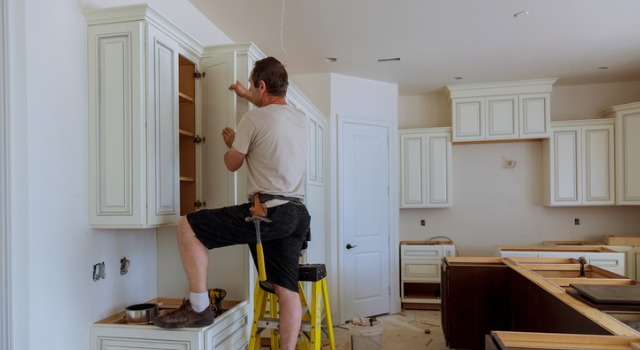By Brentnie Daggett
As a homeowner, you have to maintain, renovate or remodel your property at some point in time. If you're a real estate investor or landlord, it is absolutely critical to take certain steps in order to protect your investment. In some cases, repairs or renovations will be needed immediately, despite the cost—especially if you have tenants in your property.
Thankfully, with a little research and some handyman skills, you can take care of many repairs and updates on your own. If you're uncomfortable or unable to perform certain tasks yourself, the option to hire a professional is always a good one. Consider completing as many projects as possible on your own time before bringing in professionals for the bigger, more important endeavors, like roof repairs, heating and cooling maintenance, or plumbing.
For the projects you decide to tackle on your own, here are some money-saving tips to help:
1. Be proactive instead of reactive. Planning ahead (to the best of your ability) will usually save you money in the long run. Try to keep a list of all the home projects you would like to tackle—separated into necessities and preferred upgrades—and create a schedule for taking care of them. Creating a schedule allows you to space projects out throughout the year based on your availability, timeline and budget.
Even with a schedule in place, issues will likely arise that need to be taken care of immediately; adjust your schedule accordingly. It's always better to deal with problems as soon as you notice them, instead of letting the issue get out of hand.
2. Take it one step at a time. The best way to stick to your budget is to gradually complete your renovations and upgrades rather than trying to tackle everything at once. Prioritize projects by importance and work through them one at a time. If you own or manage multiple properties, you'll find it significantly cheaper to approach them in this manner instead of trying to upgrade all of your units at the same time. If you're only renovating one property, try to cross things off one by one instead of upgrading the entire property all at once.
3. Take advantage of time between tenants. If you don't have tenants living at your property, it's ideal to complete any renovations or updates while the property is unoccupied. Doing so will give you the space and freedom you need to get work done without having to worry about notifying tenants or disturbing your tenants' rights. Even if you don't have any necessary or immediate repairs that need to be completed, use the time between tenants as an opportunity to consider updates that may increase your property value. If you have the budget to cross a few smaller projects off your wish list, you may be able to ask for a higher monthly rent at the beginning of your next lease term.
4. Make energy-efficient decisions. As you make updates and repairs to your property, consider keeping sustainability and energy efficiency top of mind, as these choices can save you money for years to come. Wherever possible, replace appliances and light bulbs with green and energy-efficient alternatives. The Alliance to Save Energy reports that installing energy-efficient appliances can reduce electricity bills by up to 30 percent. Weatherproofing and proper insulation are also easy, cost-effective ways to save money and energy.
5. Choose materials that will last. If you notice that regular maintenance isn't keeping your interior in proper shape, or you find yourself often repairing the same issue, it might be time to consider replacing certain features with newer, high-quality alternatives. Choosing high-quality materials that last longer and can withstand the usual wear and tear that goes along with a rental property are usually worth the higher upfront cost. Not only will durable materials be easier and cheaper for you to maintain, but sometimes they can even improve the desirability and marketability of your property.
Whether you're remodeling a rental property or your own home, your decisions surrounding renovations should be smart, savvy and practical. Weigh all of your options and look for easy and efficient ways to update your property to provide maximum results without breaking the bank. If you maintain your property regularly and address issues before they become major problems, you can significantly cut your remodeling costs.
 Brentnie Daggett is a writer and infographic master for the rental and property management industry. She loves to share tips and tricks to assist landlords and renters alike. To learn more about Daggett, and to discover more great tips for renters, visit www.rentecdirect.com.
Brentnie Daggett is a writer and infographic master for the rental and property management industry. She loves to share tips and tricks to assist landlords and renters alike. To learn more about Daggett, and to discover more great tips for renters, visit www.rentecdirect.com.









Thanks for posting. We work with a ton of property owners who handle their own work. This article will be most helpful. We will share it on our Facebook page.